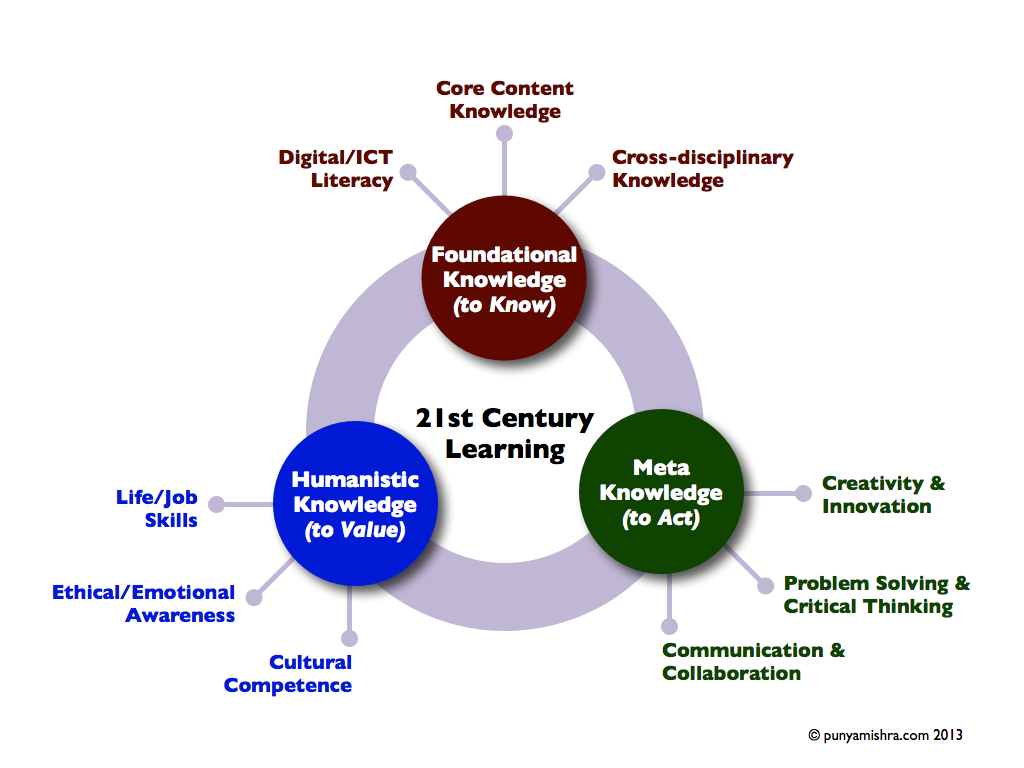


by TeachThought Staff
Thinking in the 21st century is just different.
That doesn’t mean we’re all suddenly omnipotent cyborgs, nor do we all become mindless social media addicts who spend our cognitive might tapping, swiping, and drooling on our smartphone and tablet screens.
But just as the 19th century presented unique challenges to information processing compared to the 18th or 20th, the 21st century is different from the one before it or from the one that will come after.
punyamishra.com recently released the following graphic, which I thought was interesting. It identified knowledge types for modern learning, settling on Foundational, Humanistic, and meta knowledge.
3 Knowledge Domains For The 21st Century Student
1. Foundational Knowledge (To Know)
Digital/ICT Literacy, Core Content Knowledge, Cross-disciplinary Knowledge
Summary
This domain encompasses the fundamental concepts and principles that form the basis of various fields of study. It includes subjects such as mathematics, natural sciences, history, and language arts. Foundational knowledge provides the framework for understanding more specialized areas of knowledge and is crucial for critical thinking, problem-solving, and communication skills.
Examples Of Foundational Knowledge
Example 1: In a math classroom, students can learn foundational concepts such as addition, subtraction, multiplication, and division through hands-on activities like visualizing mathematical operations using manipulatives (such as blocks or counters).
Example 2: Teachers can introduce foundational knowledge of chemistry by conducting hands-on experiments to explore the properties of different elements, compounds, and chemical reactions, such as mixing acids and bases to observe changes in pH.
Example 3: Teachers can introduce foundational knowledge of world history by analyzing timelines and maps to trace the major events, movements, and empires that have shaped global civilizations over time.
Example 4: Teachers can integrate humanistic knowledge by analyzing the characters, motivations, and ethical dilemmas presented in literary texts, encouraging students to empathize with diverse perspectives and experiences.
Example 5: Students can learn about foundational concepts in physics by conducting experiments to understand Newton’s laws of motion, using simple materials like ramps, balls, and spring scales.
2. Humanistic Knowledge (To Value)
Life/Job Skills, Ethical/Emotional Awareness, Cultural Competence
Summary
Humanistic knowledge focuses on studying human experiences, values, and cultures. It includes literature, philosophy, art, religion, and ethics disciplines. Humanistic knowledge helps individuals explore questions of meaning, identity, morality, and social justice, fostering empathy, creativity, and a deeper understanding of the human condition.
Examples Of Humanistic Knowledge
Example 1: Students can use creative writing exercises to express their thoughts, emotions, and insights, drawing inspiration from literary works and personal experiences to explore themes of identity, belonging, and self-discovery.
Example 2: Teachers can facilitate philosophical discussions on timeless questions such as the nature of reality, the meaning of life, and the existence of free will, encouraging students to examine their own beliefs and assumptions critically.
Example 3: Students can engage in debates and Socratic dialogues to explore ethical dilemmas and moral reasoning, applying philosophical concepts to real-world issues and ethical decision-making.
Example 4: Teachers can integrate humanistic knowledge by encouraging students to create artwork inspired by beauty, love, struggle, and transformation, using various media and techniques to express their ideas and emotions.
3. Meta Knowledge (To Act)
Creativity and Innovation, Problem-Solving and Critical Thinking, Communication and Collaboration
Summary
Meta-knowledge refers to knowledge about knowledge itself—the processes, structures, and strategies involved in acquiring, organizing, and evaluating information. It encompasses critical thinking skills, information literacy, research methodologies, and metacognition. Meta knowledge empowers individuals to become lifelong learners, adapt to changing environments, and make informed decisions in a rapidly evolving world.
Examples
Example 1: In any subject area, teachers can incorporate critical thinking skills by posing open-ended questions that require students to analyze information, evaluate evidence, and construct reasoned arguments supported by evidence and logic.
Example 2: Teachers can use case studies or real-world scenarios to challenge students to apply critical thinking skills to complex problems and decision-making situations, encouraging them to consider multiple perspectives and weigh the implications of their choices.
Example 3: Students can use metacognitive tools such as concept maps, graphic organizers, or learning journals to organize and review their thoughts, connect new information with prior knowledge, and identify patterns or gaps in their understanding.
Using This Model In Your Classroom
The simplest way to use this kind of model in your classroom is to consider it a framework for planning, whether at the unit, lesson, or activity level. In that way, you could try to have a balance across the three knowledge domains, or one unit heavily pursuant of Humanistic Knowledge (a To Kill A Mockingbird novel study, for example), while another project-based learning unit focuses on Meta Knowledge.
But on a broader and perhaps more subjective level, this graphic can serve as a simple reminder that our jobs as teachers are to help students understand how to know, value, and act, no matter that the majority of these seem to go beyond common classroom assessment tools.
The concept of knowledge domains can support the development of critical thinking skills. Students can learn to analyze and evaluate information, identify patterns, and conclude by engaging with domains (one of many) like foundational knowledge. Humanistic knowledge promotes empathy, perspective-taking, and the ability to consider diverse viewpoints, while meta-knowledge fosters metacognition, information literacy, and the capacity to think reflectively about one’s thinking process.
The big idea of all learning then may start with knowing, which leads to valuing, which informs action in relevant and authentic communities.